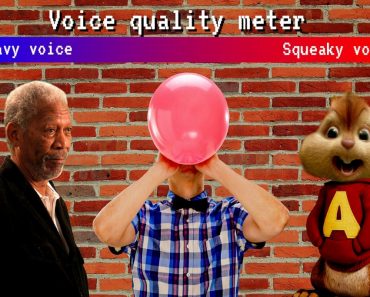Table of Contents (click to expand)
The element that causes some people to sing well and others to sing badly are problems with pitch accuracy, also known as intonation. Pitch can be understood as the ‘sharpness’ of a voice; the higher the pitch, the sharper and shriller the voice sounds.
Some people are born with certain innate abilities that melt our hearts or astonish us. Watching a great movie, you feel inspired, read a good book and realize the complexity of the world, listen to a good singer and the world suddenly appears more beautiful.
But is the ability to sing beautifully a throw of the genetic dice, or can anyone learn to sing well?
Were Beyonce, Adele, Chris Martin and Christina Aguilera born with this gift, or were it years of practice that made them so talented?
As it turns out, singing beautifully is the result of a combination of innate talent and relentless effort. Unfortunately, not everyone’s voice is particularly pleasant to hear.
So why do some people always seem to sing badly?

Recommended Video for you:
What Is “Bad Singing”?
A strange question, isn’t it?
Although it is quite difficult to define the boundaries of “good singing,” since “good singing” cannot be the same for you and your friends, good singing can be scientifically distinguished from bad singing. If you are a bad singer, this means that you are lacking in one or more of these areas; timing (the ability to keep time in the music), note memory, and pitch accuracy.
It has been observed that the majority of people are quite decent when it comes to the memory and timing of notes. Regardless of whether one is trained in singing or not, most people would be able to identify the song you are singing, even if you are not singing particularly well. This is undeniable proof of the ability to memorize notes.
Also Read: Why Does Your Voice Change When You Have A Sore Throat?
Why Can Some People Sing Well But Others Cannot?
Good singers are born with an amazing “instrument” that includes lungs with excellent vital capacity, exceptional breathing control, and a larynx that allows them to stretch and squeeze their vocal cords to achieve the desired vocal range. Shape and size of the pharynx and nasal cavities also correlate with its ability to sing.
A good example of this is a guitar; each guitar will sound different, even while using the same strings, due to its individual shape and size.
Psychological aspects of a person also play a major role in their ability to sing. Those who are sure of their singing have a higher chance of success in music than those who doubt themselves and their talents.
Furthermore, people who have been exposed to music from a young age and grew up in an environment where singing is encouraged have a higher chance of being good at it.
Another very important element that makes some people sing beautifully and others bad are problems with pitch, which is also known as intonation. Pitch can be understood as the ‘sharpness’ of a voice; female voices typically have higher pitch than male voices.
Pitch is measured in cents; 1 semitone is made up of 100 cents, which is equivalent to one-twelfth of an octave.
Pitch errors can be regarded as the difference in the number of cents of the sung tone from the intended tone. If your tone is off the intended tone by more than 50 cents, then your singing would likely be considered “bad”.
Interestingly, a study has shown that, as humans, we are able to recognize different pitches and replicate them on an instrument, although it may be difficult for some of us to hear a pitch and recreate the sound with our voices, showing that we actually have the innate ability to “recognize” pitches. What we lack is a good ear to hear the pitch in which we sing when we try to replicate it, which makes us unable to sing it correctly.
Why Is This Happening?
The problem with the brain lies in not being able to adjust its internal activities against a particular target (which, in this case, is a particular tone). That may be a bit confusing, so let’s break it down a little further.

When you hear a melody, your brain has a perception of its various parameters, such as volume, pitch, tone, etc. Human brains are pretty good at perceiving the right tone, which means that the possibility of our brain’s perception of the sound is excluded.
Therefore, the “input” component is fine in this case; the problem occurs at the “output.” After you hear the sound, the brain sets up an output sound that corresponds to what you hear, but unfortunately it is not in tune. In other words, the majority of bad singing is due to “poor motor skills” and ‘timbral-translation errors’.
Also Read: Why Do We Feel The Urge To Sing Along To Songs We Know?
Why Can’t I Sing?
Even when you do realize when you are singing off-key, there is not much you can do about it. Your ears do register that you’re not quite producing the tone that you intended to, so the vocal cords ask for instructions from the brain.
However, the brain still sends the same instructions, and you simply can’t get the tone right. It’s almost as though the vocal cords have locked themselves in a particular position to produce the same erroneous tone every time, even after knowing better!
Also, you may be using your “speaking voice” instead of your “singing voice.” When speaking, we usually use a lower limited range, whereas our singing voice is relatively high.
It is easier to teach a child this skill than an adult, because the longer a person tries to sing with their speaking voice, the more difficult it becomes to break this habit. Therefore, it is only a matter of continuously practicing relaxing your vocal mechanism and singing with assisted breathing, rather than getting the voice to “do something.”
Practice Is Key
People are born with certain connections within the brain that make enormous differences in many of the abilities and weaknesses they possess. However, the good news is that these connections, which have long been considered permanent, can actually be altered by extensive practice.
Yes, practicing the same activities over a long period of time can be very effective in readjusting and redefining these connections, and thus your appeal as a singer!
It is important to remember that singers are not only born, but also made. If you hear your favorite singers sing over time, you will probably have noticed significant changes in their voices. Taylor Swift, for example, sounds very different today than she did five years ago, and in a good way. This may be due in part to maturity, but a large part of it is due to consistent and thorough practice.
So don’t worry if you can’t sing well now, it’s just a matter of time and patience. Who knows, maybe one day, after enough practice, you’ll be able to sing a beautiful song to an audience full of people. Don’t let anyone tell you you have “a bad voice.” An important part of the process is simply to learn to feel comfortable with the unique voice you have. You can always practice to find the perfect pitch!












